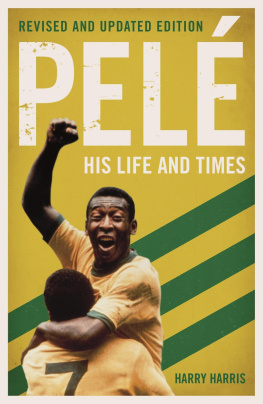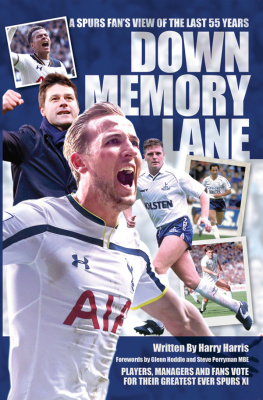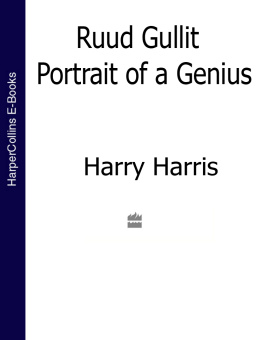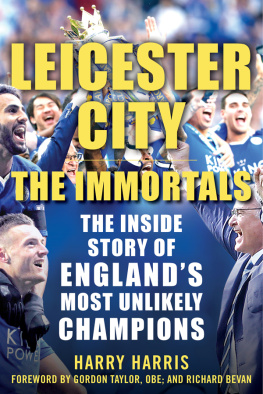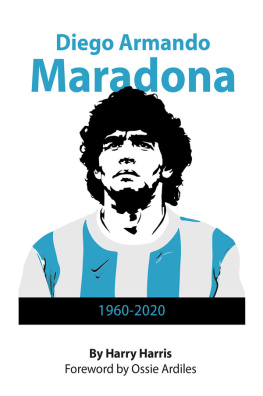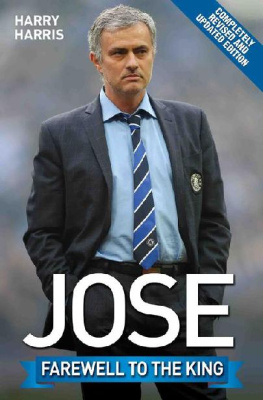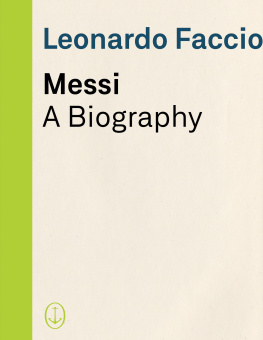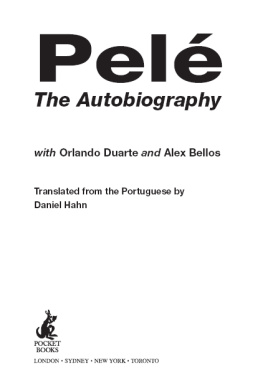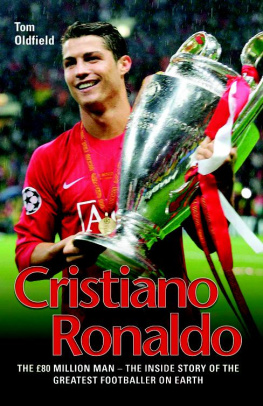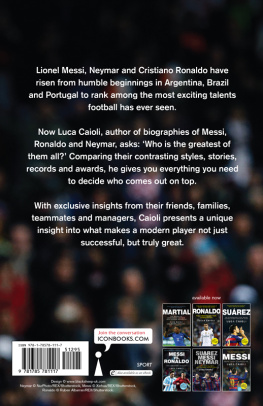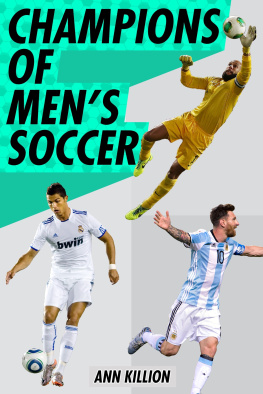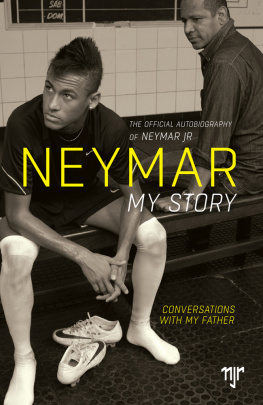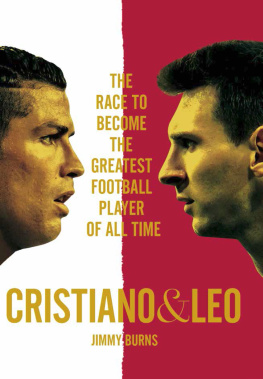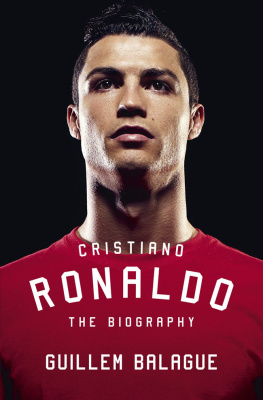This book was first published in 2000, and was the first biography of Pel to receive the players full cooperation. This new edition brings his extraordinary story up to date in the last two chapters, but to maintain the immediacy of the original edition, the preceding text has been left as originally published. Pel, after all, belongs to the history not only of football, but of Brazil and the wider world; it seems apt, therefore, that the first part of his journey should be described in the words of the time.
P el personally has helped me over the years with numerous interviews in numerous locations from Rio to Dusseldorf. But this book could not reflect the true nature of the man or the footballer without the undiluted and freely given contributions of those who know him well, and of course of many high-profile personalities, past and present, within the game. Special thanks are due to FIFA head of communications Keith Cooper.
Of all these contributors I am most indebted to Sir Bobby Charlton, Englands own global ambassador, who has played against Pel and with whom Pel has a special rapport. In Rio, I had the privilege and the pleasure of interviewing Jairzinho, Gerson and the mastermind behind the greatest team, coach Mrio Zagalo, whose mind is as alive and active as ever at the age of sixty-eight.
My thanks, too, to the late George Best, for describing his feelings of forever being in the top five Best of All Time list without ever being able to dislodge Pel from pole position.
Fascinating insights into Pel as a player and a person have been provided by Kevin Keegan, Craig Brown, Ossie Ardiles, Gary Lineker, Trevor Brooking, Tony Banks MP, Ken Bates, Andy Roxburgh, Alan Mullery, Alan Hudson, Gordon Taylor, Doug Ellis, George Graham, Garth Crooks, Russell Osman, Jimmy Armfield, Terry Butcher, Gordon Hill, BBC Radio 5 Lives Alan Green and Mike Ingham, and Henry Winter of The Daily Telegraph.
Special appreciation goes to a dear friend from New York, Tony Signore, who has worked closely with Pel since 1991 when his public relations company, Alan Taylor Communications, first began to deal with the MasterCard account. Through Tony I have been privileged to have met Pel socially, which has enabled me to interview him in a relaxed and amenable atmosphere. Tony, Ryan Mucatel and Rick Liebling were instrumental in arranging for me to see Pel at the 2002 World Cup draw in Tokyo in December at a crucial stage of my research.
Peter Draper, Martin Prothero, Simon Marsh, and Tim and Gillian at Umbro International have also organised on my behalf a number of interviews with Pel during which I have got to know the great man and to enjoy his company both socially and professionally. Peter has moved on to become commercial manager at Manchester United.
Available details of Pels life and career are fragmented, and books such as Brian Glanvilles authoritative Story of the World Cup, David Yallops investigation into Joo Havelange in How They Stole The Game, The Beautiful Team: In search of Pel and the 1970 Brazilians by Garry Jenkins, Bobby Moores authorised biography (written by his close friend Jeff Powell and first published by Everest Books in 1976), and Pels own autobiography published in 1977, have been invaluable to my quest to produce the definitive biography.
A s Manchester United prepared for the inaugural World Club Championships at the Maracana Stadium, I posed proudly for a picture with Jairzinho outside the Intercontinental Hotel in Rio. Here in the spiritual home of the game, Jairzinho delivered a remark as profound and as memorable as one of his brilliant goals. Nobody has an opinion about Pel we just thank him for being such a wonderful player and for bringing so much happiness to the Brazilian people.
Pel has talked about the joy of playing with Jairzinho, and Jairzinho confirmed that the feeling was mutual. I feel the same, he said through an interpreter. It was wonderful to be able to play with Pel. He is the best in the world.
The dawn of the twenty-first century established Pel not only as the greatest footballer of all time, an honour he unarguably held already, but also as the planets outstanding athlete. In the inevitable profusion of awards to mark the millennium, Pel vied with Muhammad Ali for the highest possible accolade. The National Olympic Committee voted Pel Athlete of the Century even though he never competed in the Olympic Games, while Muhammad Ali, Olympic light-heavyweight champion of 1960, came second. The highly respected French sports daily LEquipe also nominated Pel Athlete of the Century and Ali second, with Carl Lewis third. Reuters, too, put Pel at the top of their list.
In Britain, Pel topped all the football polls and featured prominently in the BBCs Sports Personality of the Century award, won by Ali. After Ali collected his prestigious trophy in December 1999, Alan Hansen, Match of the Days pundit, wrote in his column in the Express:
It is only natural to celebrate our sporting heroes as the end of the millennium approaches. The BBC honoured the man who will always be the greatest: Muhammad Ali. And in football too there remains no contest. It will take someone very special indeed to usurp Pel from his throne. Diego Maradona went close, but nobody has ever seriously challenged Brazils most famous number 10. And when it comes to the finest teams of the century, on the international stage it can only be Pels 1970 World Cup winning side. I can vividly recall those late nights sat in front of the telly watching them play in Mexico. For a fifteen-year-old with a head full of dreams it was wonderful to see. The magic of Jairzinho, the brilliance of Rivelino, the intelligence and creative genius of Gerson, and the revolutionary skills of Carlos Alberto. And then, of course, there was Pel. No other side has ever had the ability to match the confidence of scoring three if the opposition struck twice.
Brian Glanville, for many decades recognised as one of the worlds leading football writers, described Pel in one of his Times articles on the sporting icons of the century as probably the finest footballer of all time, a remarkable compound of athleticism, skill, flair and opportunism. We saw the best of him in the 1958 and 1970 finals; a maker and taker of goals.
George Graham, one-time manager of Tottenham Hotspur, says:
One of the big regrets of my football career was that I was never on the same pitch as Pel. I played for Scotland in the Maracana when we were beaten 10 but Pel never played. That was such a pity. Ive no idea to this day why he was not in the side perhaps he was injured. Ive never seen him live, either, although I have studied many videos of his games. He had everything. All the great players had power allied to their enormous talents, and Pel could look after himself, all right. As he got older and more experienced, he was able to do it far more subtly. I would liken Pel to Nureyev: grace allied to power.
Kevin Keegans assessment is that Pel has made an enormous contribution to sport, and still does. Not that he knows him personally. Though he played against him once, for England against Team America when Pel was close to forty, Keegan has not had the good fortune to have spent long enough in his company to engage in any meaningful conversation. Yet the England coachs affection for Pel the player is unlimited, and he has no hesitation in placing the Brazilian as the pivotal figure in the advancement of the game in terms of promoting its aesthetic qualities. He did so as the worlds best footballer and continues to do so as its worldwide ambassador. When he walks into the room, the king or queen of that country couldnt make more of an impact, says Keegan. For me, he is the man of the century. Some great players have come and gone, but Pel has stayed around from the time he started, in the late fifties, until right now. At the draw in Japan for the 2002 World Cup the whole place stopped when he entered the forum. Everyone looked round, as if to say to each other, There he is. Just getting a look at him was enough. He has a royal status.

